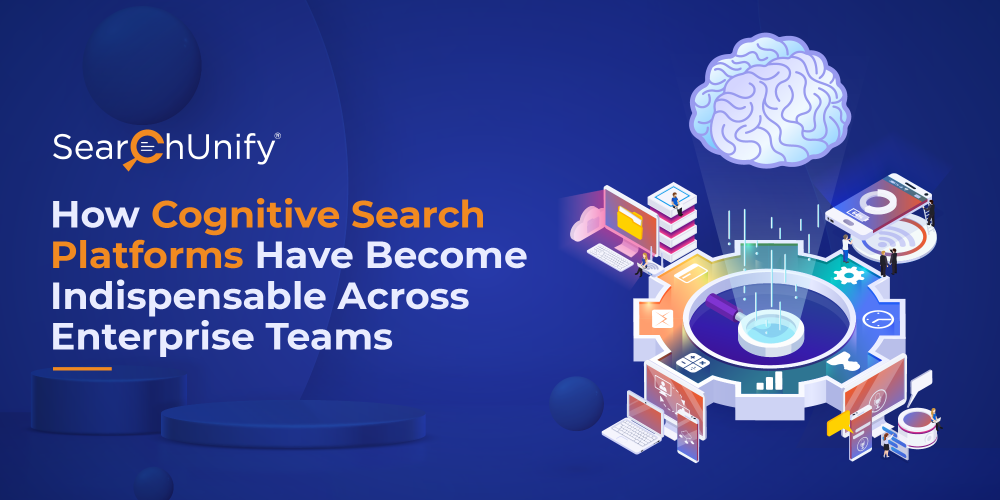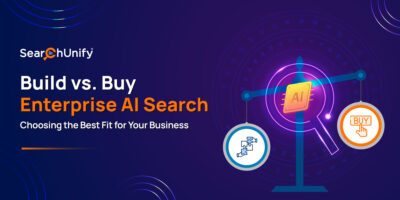
Today, data has become irrevocably intertwined with business strategies because leaders want to pursue progress, innovation, and on top of all, outshine others. And extracting value from organizational data helps achieve these goals, that too, at scale.
But where there is data, there are data silos.
To overcome this hurdle and tap into the collective organizational knowledge in real‑time, forward‑thinking firms have started adopting cognitive search platforms. Because, to quote
The Forrester Wave™: Cognitive Search, Q3 2021, “cognitive search platforms ingest, organize, and understand data from enterprise data sources to provide employees with precise insights and answers to important business questions.”
In simple words, they unify your entire tech stack—chat collaboration tools, file systems & databases—so that your employees, customers, and stakeholders can effortlessly connect to the information most relevant to them. So, is that it? We’ve barely scratched the surface here. This post delves deep into the lesser-known applications and the top five use cases of cognitive search.
Cognitive Search Platforms – A Disruptive Force for Good
Dubbed as the “AI version of enterprise search,” cognitive search uses natural language understanding (NLU) techniques and machine learning (ML) to understand the context behind queries. Then, it optimizes the results based on user profiles and search history for elevating digital interactions. It even segregates your content by proactively tagging information at the back-end so that relevant information is easy to find.
And if that doesn’t pique your interest, here’s the ultimate application of cognitive search platforms: they provide developers with SDKs, APIs, and customizable tools to build applications on top of the core framework. Just imagine a customer-facing chatbot on your website that’s more than just a greeting tool. A cognitive search-powered chatbot can scour multiple enterprise data sources and use AI to answer questions that it wasn’t trained for or were part of its conversational flow.
Thus, it’s no longer a question if enterprises need to adopt a cognitive search platform. It has mind-bending benefits that guarantee long-term success. In this remote and uncertain world, it’s the most holistic approach to tap into organizational knowledge and turn every employee into a genius and customer into an advocate.
Now, let’s dive deeper into what cognitive search can do across an enterprise. Here are our top five picks.
Top 5 Use Cases of Cognitive Search for Enterprise Teams
With the shift to remote or hybrid working environments, each enterprise team faced unique challenges. Let’s take a look at them.
1. Customer Support
Last year, Tethr analyzed around a million customer service calls from over 20 companies representing a broad spectrum of industries. The analysis showed a dramatic increase in customer anxiety and frustration alongside agent struggle in finding effective responses. This revealed gaps in the way information is accessed and also companies’ self-service capabilities.
2. HR Department
The process of recruiting best fits for a role has gone remote. Even existing employees want better-suited growth and learning opportunities to stay motivated & engaged. The HR department is the key to address these challenges. But without proper insights into where employees are struggling, they can’t do much. Not to mention, they need the right tools to ensure remote onboarding is seamless.
3. LMS (Learning Management System) Teams
No team training sessions and discussions in a physical setting can be boring, isolating, & disengaging. Cognitive search platforms ensure a similar experience is delivered even with remote teams. They promote collaborative learning by building a highly engaging digital space where users can exchange ideas, ask queries, share their knowledge or expertise, and discuss best practices. These platforms even assist in curating personalized learning experiences for all employees by recommending articles & courses based on their preferences & profiles.
4. Marketing & Sales Function
77% of US businesses say they advanced their tech stack more last year than the previous three years combined. It means that the marketing and sales have a whole flurry of tools to their rescue. However, this often leads to tech silos. These silos further hinder your teams from getting a unified view of the customer trail and insights that could help personalize your marketing efforts and bring in more leads.
5. Business Operations Teams
These teams faced the challenge of scaling the tech stack across different verticals for operational resilience and efficiency. Luckily, cognitive search platforms are easy and quick to deploy and can integrate with your tech stack quite seamlessly. On top of that, they offer high scalability, which makes them a godsend for business operations teams.
To Sum Up
Cognitive search platforms offer a holistic solution to all these challenges, which results in elevated enterprise outcomes for multiple teams. That said, to fully realize its potential, you must strategize its adoption and choose a vendor that fits your business-specific needs.
Mike Gualtieri, VP & Principal Analyst of Forrester Research, has authored more than 130 research reports, advises business leaders around the globe, and is a seasoned expert to share precise insights & tips for vendor selection. He will be joining Alok Ramsisaria, CEO of SearchUnify with over 30 years of marketing, technology, and consulting experience, for a live webinar to shed light on how enterprises can leverage cognitive search technology across various business functions. Register for the webinar today!











